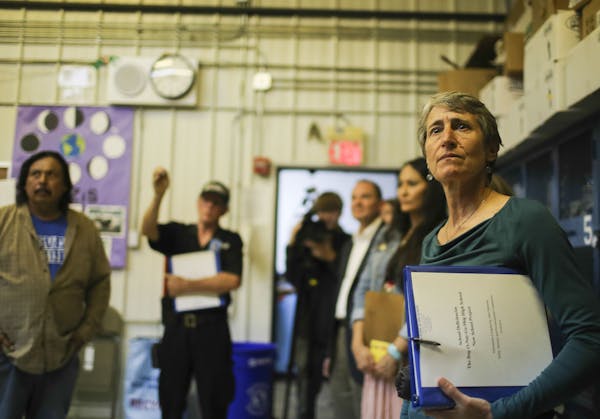The Bug-O-Nay-Ge-Shig school in northern Minnesota, held up as an example of the decrepit conditions found at Indian schools across the country, now is getting caught in the crosshairs of competing efforts to rebuild it.
State Sen. Terri Bonoff, DFL-Minnetonka, spurred by reports of the school's deterioration, has proposed a bill that would rely on state and private funding to finally fix the tribal school.
But tribal leaders, who have been in Washington lobbying for federal cash, fear the Bonoff bill could wind up hurting more than it helps, dropping Bug-O-Nay-Ge-Shig even further down the federal priority list and putting major upgrades out of reach if the state pulls through with funding. It could also set an expensive precedent.
U.S. Rep. Betty McCollum, D-Minn., who has been working with tribal leaders for years to secure more federal money, said Bonoff should have coordinated with the tribes before launching her own effort.
The Leech Lake Band of Ojibwe, McCollum noted, has its own school board and elected officials. "It was greatly disappointing to me to find out that legislation had been drafted affecting Leech Lake … and there was no collaboration," McCollum said. "There's a lot of questions about the consequences of the state legislation and even how it would work — if it could work — and what that could potentially mean for the state of Minnesota then starting to assume responsibilities."
Bonoff says she is standing by her bill and is frustrated with the slow pace of progress in Washington.
"I'm not willing to let those kids to continue to go in a school like that," Bonoff said. She said she stands "100 percent" with McCollum on the need for the federal government to "keep their promise with regard to our BIE schools, and I'm very disappointed that it hasn't happened."
McCollum, the ranking Democrat on a House Appropriations subcommittee that oversees the Bureau of Indian Education (BIE), said she's optimistic funding will come soon, despite years of inaction by Congress.
Bonoff's bill would provide $5 million in a matching state grant that would supplement any private money raised. The Leech Lake Indian Reservation school was the focus of a recent Star Tribune editorial series on the condition of schools run by the BIE.
The bill introduction surprised tribal leaders, said Carri Jones, chair of the Leech Lake Band, who expects to meet with Bonoff next week to discuss her legislation regarding the Bug-O-Nay-Ge-Shig school in Bena.
In a statement, Jones said Thursday that the tribe had only recently become aware of the Bonoff proposal. Tribal leaders, she said, "are reserving judgment on its merits until we have had the time to adequately review its provisions and the possible impacts of state intervention. We welcome and look forward to working with anyone seeking to improve educational opportunities in Indian Country."
Weighing a state role
State officials meanwhile are debating what role — if any — the state should play in improving education, facilities and programming at schools on Indian reservations, which historically have been a federal responsibility.
"There are some things that are very clearly the responsibility of the state … but regardless of where a student is attending school, we have a responsibility to ensure that we are caring for and making sure that these students are well served," said Charlene Briner, chief of staff at the Minnesota Department of Education.
Briner is part of a working group formed by Gov. Mark Dayton to explore ways to better serve tribal students. The group is expected to release recommendations that could aid these students after a Jan. 30 meeting.
"When we look at the way of outcomes for American Indian students and the opportunities that they are receiving, we have a lot more work to do," Briner said.
Dayton in a letter Thursday urged BIE Director Charles Roessel to do more to fix "the deplorable situation" at Indian schools, which Dayton called a "shameful failure of federal responsibility."
The BIE operates 183 schools on 64 reservations in 23 states, including Bug-O-Nay-Ge-Shig and three other Minnesota schools. Sixty-three of those schools are rated in poor condition, including the Bena school.
BIE schools have been underfunded for years, particularly compared to Department of Defense schools, another federally funded system that serves military families. In 2010, the Department of Defense requested $3.7 billion to replace or modernize 134 schools. In 2014, the Indian Education budget received just $55 million for construction and repairs — for the entire system. The estimate to replace the Bug-O-Nay-Ge-Shig school alone is about half that.
McCollum, who also co-chairs the House Native American Caucus, said she has worked with U.S. Sen. Al Franken and U.S. Rep. Rick Nolan and is making headway on the years-long effort to secure more funding for Indian schools.
The Minnesota congresswoman is traveling to Arizona this weekend with Interior Secretary Sally Jewell to visit reservations there and drum up support. McCollum said she is optimistic President Obama will allocate money for Indian education in his upcoming budget and said state interest is welcome, but would require further discussion.
"I'm trying to hold the federal government accountable for these responsibilities," McCollum said. "Putting these responsibilities back on Minnesota taxpayers, I don't think it should be the first step.
Ricardo Lopez • 651-925-5044
Biden administration moves to make conservation an equal to industry on US lands
Coalition to submit 900,000 signatures to put tough-on-crime initiative on California ballot

Rep. Omar's daughter arrested, suspended from college for pro-Palestinian protests
First major attempts to regulate AI face headwinds from all sides

